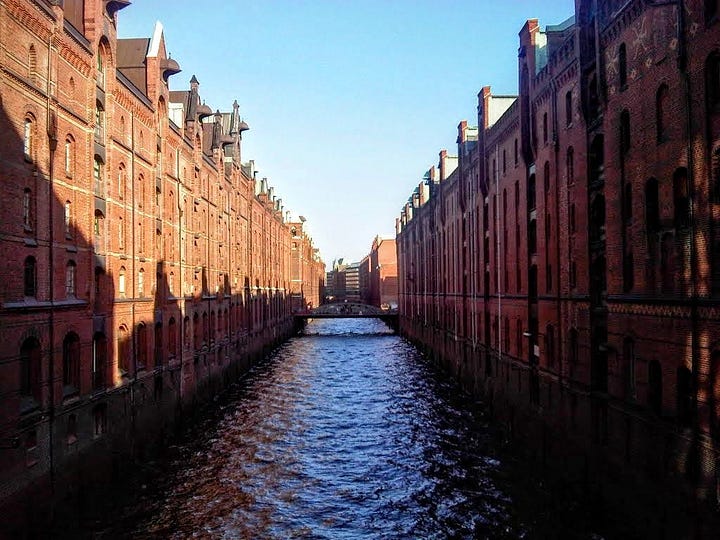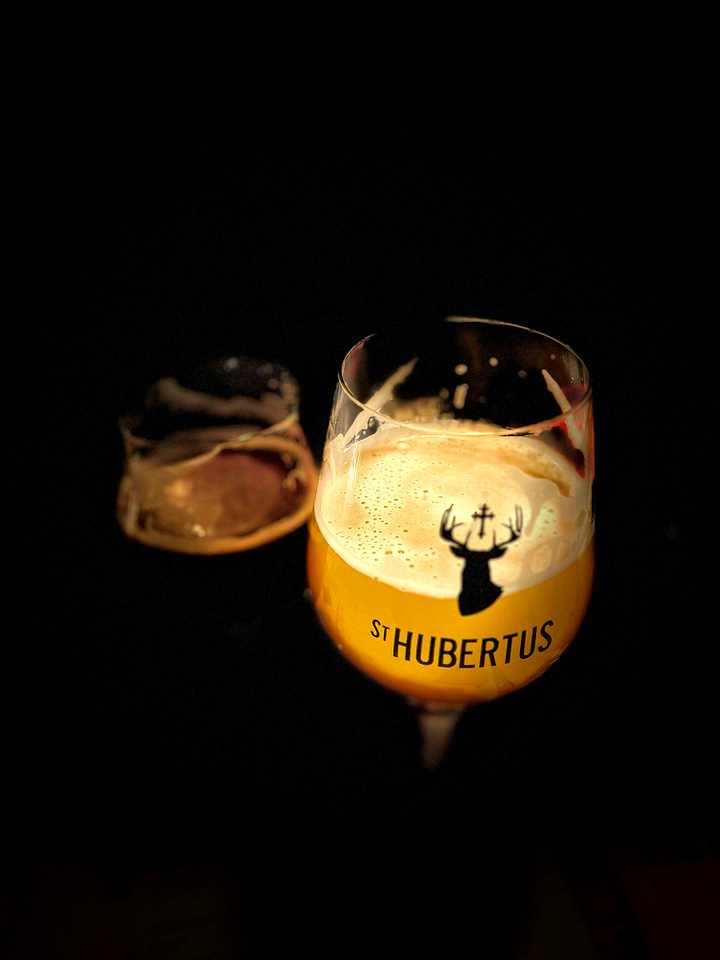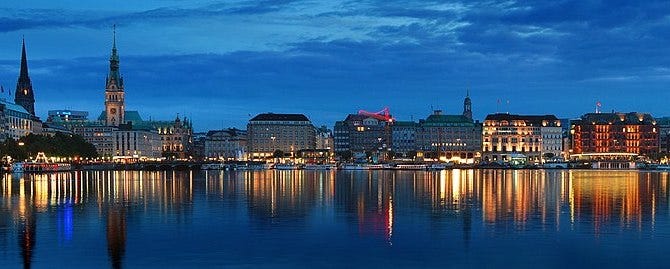When I disembarked from my ship, MS Caribia, in Cuxhaven in late May 1975, I had only the vaguest of plans for how I would spend my time in Germany—that is, West Germany, as the country was still divided at that time. I was fond of a number of seventeenth-century German composers from north Germany and imagined a pilgrimage to Lübeck and the Marienkirche there, thinking of the journey Johann Sebastian Bach had made from Saxony to Lübeck in 1705 to hear the Adventsmusiken of Dieterich Buxtehude. I was also fond of the sound of organs from the so-called “north German school” of organ builders of that time, above all the clear, crisp and sometimes snarling sound of instruments built by Arp Schnitger, and hoped to see and hear some of them. Beyond this idea, I had no distinct itinerary.
I managed to realise my modest plan for travel in the north of Germany, through Niedersachsen and Schleswig-Holstein. Just as I’d had insufficient money to travel to Europe by air, I had little for other forms of transportation and relied almost wholly on hitchhiking to get around. On my way to Lübeck, I passed through the village of Altenbruch, close to Cuxhaven, and visited the Nikolaikirche there, meeting the organist who was practicing at the time and who let me play the instrument as well. I remember how the hair on the back of my neck prickled when, toward the end of the first section of the Buxtehude Prelude in G minor, he pulled the organ-stop that activated the Zimbelstern—a star with bells attached that would rotate and create a cascade of enchanting chimes. When I finished that section I stopped playing and the Zimbelstern continued; we listened for a few seconds as the sound of the bells reverberated throughout the church, then just looked at each other and laughed. Then on to Lübeck to visit the Marienkirche and to discover the wonderful “Lübecker Schwarbrot”—the delicious chocolate-covered Marzipan for which the city is well known.
The sailors abord Caribia had recommended that I visit Hamburg and I did, but not to the centres of illicit nightlife they spoke of. The city reminded me of Boston, which by now I had come to think of as home. The brick buildings; the low profile of the city skyline, with church steeples rising here and there; the basin of the Alstersee, a body of water formed by a dam in the Alster River, reminding me of the Charles River and Esplanade in Boston; and the sounds of gulls and other birds hovering above.
I had found a map and wandered around the town. I had one concrete destination: the Hauptkirche Sankt Jakobi to see the famous organ built by Schnitger in the late seventeenth century—sadly no chance to play this one though I did get to examine the console with its split sharps. But there was so much more to see and experience in Hamburg. I had my first taste of Alsterwasser, a slightly sweet and effervescent mix of lemonade and beer—a refreshing drink on a hot day and something I would never have imagined. Then time wandering around the Speicherstadt (Warehouse City), an extraordinary quarter of large brick warehouses that had served trading ships on the Elbe River. (I have visited there since, and it is now a much more respectable and vibrant part of town.)


When I departed Caribia in Cuxhaven, the first people I encountered were Americans—two young men with white shirts, ties and sport jackets standing in the warm sun outside the customs area of the docks. They greeted me in German with roundly inflected American accents: they were Mormon missionaries and handed me a pamphlet entitled “Was ist eigentlich Mormonen?” (What is Mormonism actually), but after a brief conversation about polygamy I moved quickly on.
I later encountered another evangelist in Hamburg, standing on the rim of a fountain, speaking over the sound of the water to a small crowd, Bible tucked under his arm, a female companion standing nearby. Two men, one holding a bottle of wine and both influenced by it, kept interrupting with irreverent questions. One called out “Ist ein Mann mit langen Haaren eine Perversion?” (Is a man with long hair a perversion?) And the answer came back “Absolut!” creating gales of laughter. Then more questions in the same vein. Eventually the ridicule became too much and the evangelist stepped down, only to be confronted with a worse humiliation. The two drunks announced that they would “baptise” the poor fellow and poured the remaining contents of the wine bottle over his head. He walked away dejected with his companion and I had, by then, seen enough.
As I travelled throughout the country I was constantly struck by the small differences in all things that were conceptually the same as I knew them in the U.S., but, in Germany, were different in important details. For example, learning to make a collect call (an “R-Gespräch”) home to tell my parents I’d arrived safely in Germany was a learning experience, starting with being confounded by German public pay phones, then coming to understand that I needed to do this from the post office. There I completed a form on a slip of paper with the details of my parents’ phone number and location, then I waited to be notified that the call had been connected. Then I proceeded to the designated booth and had my brief chat.
I was struck, too, when hitchhiking, that whenever a car stopped for me the driver would kill the engine while I climbed in, then again turn off the engine at every red traffic signal (before turning green again, the yellow lamp would come on simultaneously with the red to indicate that it was time to restart the car). This mindfulness of economy and conservation impressed me in other contexts as well—such as the perseverance of return bottles for liquids in the food shops, and people carrying their own bags and baskets to shop for food. These were no longer common back home.
Hitchhiking was a relatively reliable way of getting around. I made my way south, following an arbitrary route determined largely by the destination of the person who picked me up, thereby causing me to visit places well off the map of tourist destinations, some of which I had never heard of before. I went as far south as the Black Forest, visiting Calw (the driver was a resident and told me proudly that it was the birthplace of Hermann Hesse) and Freiburg im Breisgau, then eastward to Munich, north through Franconia to Nuremberg (with a side-trip to the medieval walled village of Rothenburg ob der Tauber), then north again through Kassel, Braunschweig, Hildesheim, Hammeln (!), Hannover, Celle and Lüneburg.
Hitching rides was, in retrospect, part of the adventure, and I found the conversations I had with many of the drivers interesting and informative. Perhaps more women than men picked me up—women my mother’s age, most of whom explained that it was dangerous to hitchhike and that they worried about me, the way they would worry about their own sons had they been travelling that way. One told me the story of her husband, a soldier during the war who had left in 1942 and only returned home in 1955 after years of detention in the Soviet Union. Others offered advice intended to keep me safe during my travels.
One gentleman who gave me a ride late in the day thought it unreasonable that I would expect to reach my destination, Freiburg im Breisgau, that evening, and took me to his home in Heilbronn for dinner with his family and provided a place to sleep on the living room couch. I awakened in the morning hearing the voice of his young daughter standing next to me as I lay on the couch. “Vati,” she said, “der Mann ist tod!” (Daddy, the man is dead!”). I had in fact slept well after the fine dinner they had fed me, and I enjoyed a lovely breakfast as well. The girl’s mother explained to me that I would more easily get a ride hitchhiking if I had a sign with the destination, and she created one that read “Student nach Freiburg” which in fact got me a ride quickly, all the way there.
I also had a couple of those experiences that one’s parents warn you about when they say “it’s dangerous to hitchhike.” One of them shook me up a bit. A fellow in a white van picked me up and seemed amiable enough until he said something that I didn’t quite understand. I understood him literally, but didn’t understand his meaning. As I recall his words were “Ich mache dir einen schönen Reißverschluss,” or “I’m going to make you a beautiful zipper.” When I didn’t comprehend he withdrew a long knife and made upward slashing motions with it while alternating his stare between me and the roadway. He went on to say more specifically that he was going to make me a zipper in my gut. I somehow managed to get him to stop and got out, in the middle of nowhere. That was one of the nights I slept outside at the side of the road in my sleeping bag, reflecting on what the hell I was doing.
I learned thereafter that many towns and cities had a “Mitfahrerzentrale,” essentially a bulletin board where people travelling by car would advertise for companions who would share fuel costs. I took advantage of this several times, but still hitched rides when this wasn’t an option.
I’ve now lost many of the memories of this long arbitrary journey, but moments stand out. In Munich I stayed at the Jugendgästehaus (Youth Guest House) in the south of the city and took the tram into the centre on Sunday morning to attend Mass at the Michaeliskirche there—a beautiful baroque church of the Jesuit order. (The trams had signs that asked that one give up one’s seat for “Kriegsbeschädigte,” those wounded in the war; such men were not an uncommon sight.) The church had an orchestra and chorus which were to perform a Mozart Mass that day. It was wonderful, not just for the music but also the pomp of the religious ceremony: the large thuribles (incense burners) flanking the altar, hanging by from chains and swinging dramatically to and fro, aromatic smoke issuing from them and engulfing the congregation; the priest, chanting, walking through the church casting holy water from his goupillon onto the faithful (just as my grandmother used to do with holy water during a lightning storm). The music was unlike anything I’d ever heard in a Catholic church: the Mozart Mass, of course, but the strong congregational singing too. I had lost all enthusiasm for religion by this time, but there were genuinely thrilling moments in this ritual. A few years later, when I came to live in Munich, I remembered the experience and often went to Mass there for the music and the spectacle.
Food made its impression as well. I ate cheaply, often buying at bakeries and butchers or street vendors, almost never on my own at restaurants. In the early mornings the scent of bread baking signalled that a bakery was nearby. Such wonderful breads. I had learned that in the morning one could purchase a still-warm bread roll, called a Brötchen or Semmel (depending on where you were), and an optional thick pat of butter, making a modest but delicious breakfast. There were sweet things as well, though on my budget these were a rare indulgence. I still can’t decide if I prefer bakeries in France to those in Germany.
I also loved the things created at the Metzgereien, the butchers specialising in sausages. Above all the soft Kalbsleberwurst, or veal liverwurst. I learned to avoid the inexpensive Leberkäs (literally “liver cheese,” although it contains neither liver nor cheese) common in south Germany, which I thought of as the spongy first-cousin of Spam. Kind people who had picked me up in their cars sometimes also treated me to a restaurant meal. I was introduced to some specialities this way—Sülze in Hessen, a kind of pork head “cheese” made with aspic, Hoppelpoppel (an egg dish) and Eisbein (roasted ham hocks) further north. The latter were called Schweinshaxn in Bavaria. I recall standing and watching the rotisserie of a place in Munich called “Haxenbauer,” an old restaurant that specialised in them, watching the beautifully roasted ham hocks rotate, teasingly dripping fragrant bits of fat until they were brown and crisp. My finances were such that all I could do was stand and imagine how delicious they must be. By the end of my trip, I had lost a lot of weight.
When money began to run low I headed back to Cuxhaven and made the rounds of the ships chandlers and brokers looking for a ship headed to the U.S. Luck was not on my side so I had to do some reckoning. I found a travel agent whose advice, given my meagre budget, was to take the ferry from Hoek van Holland to Harwich, England, then the train to London and Heathrow. Those were the days of standby flights, where one could wait at the airport to learn whether a flight was full or not, then purchase a seat from what remained at a significant discount. I took the advice and found myself living at Heathrow until I was able to find an affordable standby seat and bring my adventure to an end.
My journey from New Bedford, Massachusetts to Cuxhaven, German on board the freighter MS Caribia is told in my story Herman Melville Boulevard.
I was to return to graduate school at the end of summer and stayed with my parents in Massachusetts until then. I talked incessantly about the trip and my observations, some of which caused my parents to remark that they remembered when “things were like that” when they were younger. In some cases they saw the differences I described as evidence of America’s progress and advancement over Europe, which they felt had clung to old ways simply because of lesser prosperity or inventiveness. But in the days and years thereafter, I remembered the greater awareness of waste I’d witnessed and tried to live better. I also found myself looking for and cooking the foods I’d enjoyed, the beers I had tasted, and even identified a shop where I could buy Lübecker Schwarzbrot.
I’ve travelled much in Europe since then. Indeed I have lived here now for more than fifteen years, not counting a year in Munich between 1978 and 1979. Influence from the United States is everywhere apparent and has resulted in many changes. German was easier to learn five decades ago, I think, since far fewer Germans spoke English at a high level. Now many younger Germans I meet speak not just perfectly, but colloquially: it’s harder for a foreigner to hold a conversation in German. Technology is pervasive and in its own dimension creates a sense of sameness across national borders, as do the media that depend upon it. The signs on public transportation no longer refer to those injured by warfare but promote deference to the elderly and disabled. Recycling bins are ubiquitous and have largely replaced the old reusable bottles, and public pay phones are almost impossible to find.
But culture is deeply embedded and shapes values, expectations and behaviours, and there is still, for me, much to absorb, learn and appreciate.





I enjoy reading about travel in the 70s and 80s. I feel there was a greater sense of discovery.